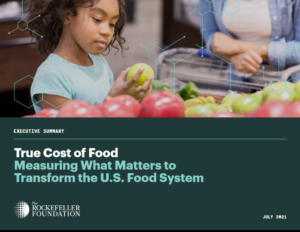Report Estimates the True Cost of Food in the US

By Reed Mangels, PhD, RD
The Rockefeller Foundation recently published a report on the true cost of food in the US. This report is an attempt to measure the costs to our health, environment, and society of the current food production system. The report points out that in 2019, American consumers spent an estimated $1.1 trillion on food. Yes, that is trillion with 9 zeroes after the 1! That’s what we pay for labor, food production, processing, and transportation. Despite the enormity of this number, the report’s authors estimate that the true cost of food is at least three times higher – $3.2 billion per year.
The report provides the following estimates of “hidden” costs of the US food system:
- Human health $1.1 trillion per year – this includes direct health care costs and the cost of lost productivity due to diet-related diseases such as obesity, heart disease, cancer diabetes; the cost of workplace injuries and the effects of pollution due to food production on health
- Environment $350 billion per year – includes greenhouse gas emissions, water use, and soil erosion related to food production
- Biodiversity loss $455 billion per year – includes land use and pollution’s effect on biodiversity
- Livelihood $100 billion per year – includes the societal costs of child labor, unlivable wages, lack of benefits, and the cost of occupational safety and health
- Economy $21 billion per year – includes agricultural subsidies that are not accounted for in food prices
These costs are disproportionately borne by communities of color, as the report details.
A limitation of this report is that it did not assign a monetary value to animal suffering. The authors call for additional study of the true cost of animal food production in the US.
You may be wondering how the information in this report might be used. Possibilities include using this information to promote change in terms of fair wages, safer conditions for workers, subsidies and incentives for farmers and manufacturers, environmental regulations, and other food-related decisions that impact our health, the health of others, and the planet. Our food choices have costs and it is important to be aware of these and to work for systemic change.
